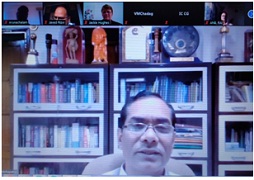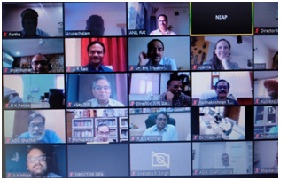4th May, 2020, New Delhi
Department of Agricultural Research and Education (DARE)-Indian Council of Agricultural Research (ICAR) conducted the Annual Review Meeting of its Partnership for Agricultural Research and Development with the Consultative Group on International Agricultural Research (CGIAR) Centres on 4th May, 2020 under the Chairmanship of Dr. T. Mohapatra, Secretary, DARE and DG, ICAR. CGIAR has 15 international organizations working on food and agriculture. India is a donor member of CGIAR System for decades and contributes substantially through Window-I and Window III of the CGIAR System. Presently, India is one of the voting members in the CGIAR System Council representing the South Asia Constituency.


Out of these 15 Centres, International Crops Research Institute for the Semi-Arid Tropics (ICRISAT) has its headquarter at Hyderabad in the State of Telangana, India. The remaining CGIAR research organizations have headquarters elsewhere, but 10 of them have their regional/country offices in the National Agriculture Science Centre (NASC) Complex. The partnership between DARE/ICAR and the CGIAR system dates back to 1974 and so far ICAR has developed strong working linkages with 12 of them. The broad areas of collaboration with CGIAR system include cooperation in prioritized areas of research and technology development to achieve targeted crop and animal productivity and quality in India, addressing specific issues of national relevance such as utilisation of rice fallows, agroforestry, rainfed/dry land agriculture and water management, access to world germplasm resources and expertise, and capacity building. One of the CGIAR’s significant contributions to India is supply of genetic material of different crops from various parts of the world which has been utilized for breeding new and improved varieties.
 A total of 102 participants joined the meeting from different CG organizations including DG, ICRISAT, as well as senior officials of DARE and ICAR. Dr. Mohapatra gave an account of the Covid-19 situation and urged all to carry out activities using digital platform as much as possible. Shri Sanjay K. Singh, Additional Secretary (DARE) and Secretary (ICAR) emphasized on developing SoPs for laboratory as well as field functions so that activities can continue.
A total of 102 participants joined the meeting from different CG organizations including DG, ICRISAT, as well as senior officials of DARE and ICAR. Dr. Mohapatra gave an account of the Covid-19 situation and urged all to carry out activities using digital platform as much as possible. Shri Sanjay K. Singh, Additional Secretary (DARE) and Secretary (ICAR) emphasized on developing SoPs for laboratory as well as field functions so that activities can continue.
Dr. J. Hughes, the new DG, ICRISAT, in here remarks assured continued support and collaboration for the cause of India’s agriculture in semi-arid areas and also for taking forward the south-south cooperation.
All the 12 CGIAR centres presented their progress during 2019-20 and gave the work plan for the year 2020-21. The progress included release/identification of 35 varieties by ICAR developed through CGIAR partnership during 2019-20. Further, the partnership involved 153 KVKs apart from several ICAR Institutes, benefitting over 3 lakh farmers. One of the major highlight was capacity building; the CGIAR Centres facilitated foreign deputation training of 74 ICAR scientists (60 short-term and 14 long-term) in different domains for enhanced skill. The Deputy Directors General (DDGs) of ICAR participated in the discussions and provided their inputs on the progress and on the work plan.
In conclusion, DG, ICAR recorded appreciation to all the CG Centres for their research partnership in steering Indian agriculture. Further, he urged that the products emerging out of this ICAR-CGIAR partnership need to be systematically promoted to realize the impact of this collaboration. Development of common programmes on rice fallows, water & climate change, gender issues and nutrition involving more CG Centres was given emphasis. The Subject Matter Divisions of ICAR were advised to periodically monitor and facilitate implementation of the approved activities.
(Source: Indian Council of Agricultural Research, New Delhi)







फेसबुक पर लाइक करें
यूट्यूब पर सदस्यता लें
X पर फॉलो करना X
इंस्टाग्राम पर लाइक करें